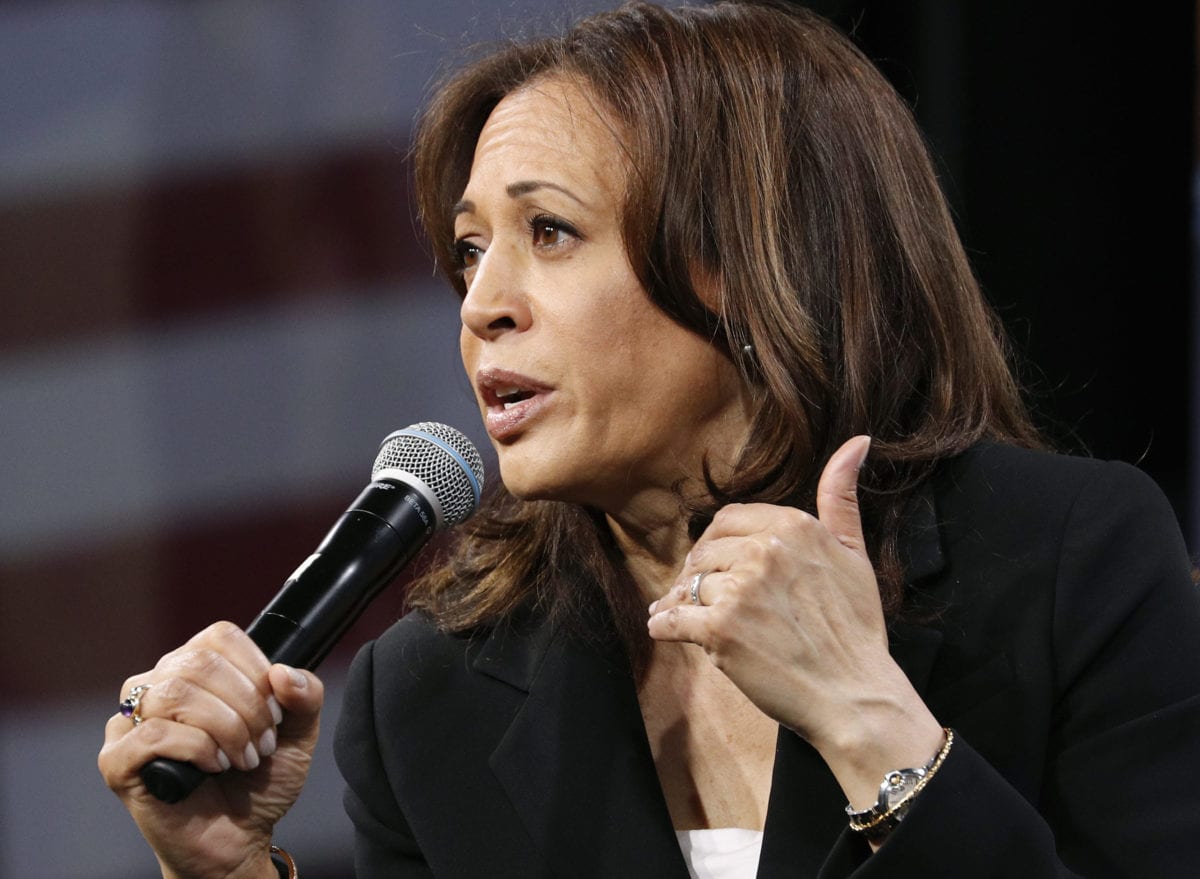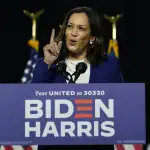This story was co-published with The Washington Post.
This reporting was supported by the International Women’s Media Foundation’s Howard G. Buffett Fund for Women Journalists.
During the coronavirus pandemic, Sen. Kamala D. Harris of California has remained in Washington, pushing for legislation that addresses the crisis’s impact on minorities and marginalized communities. The 19th spoke with the former 2020 Democratic presidential candidate during Black Maternal Health Week about issues including maternal mortality, pay equity, benefits for low-wage workers and how the pandemic could impact the 2020 election.
This interview has been edited for length and clarity.
19TH: Let me start by just asking how you are and how you and your family are navigating this pandemic.
HARRIS: Everybody is making it work, right? And so it is about adjusting to a lot. … I am doing more phone conferences and Zoom conferences all day long. There’s a good 10 minutes total that is spent saying, “Can somebody mute themselves? Can somebody unmute themselves? Who’s the heavy breather?” But many of us who are as fortunate as we are are having a very similar experience. What pains my heart is people who are standing in food lines for hours, those health-care workers.
19TH: A lot of your focus has been on how this crisis is disproportionately affecting women and marginalized communities, whether they ever get the virus or not. Why is it particularly important now to sound the alarm on these issues?
HARRIS: Any crisis hits those who were in crisis before the hardest. And the reality is that this public health crisis has shone a microscope on the gross disparities that existed based on race, based on income, long before we ever heard the word “coronavirus.” And so the focus that I’m putting on it is just to make sure their voices and their experience are heard in a way that we not only bring immediate relief, but we also see this as a moment that is demanding that we fix broken systems.
When you look at issues like health disparities based on race — but it’s also based on income — what we’re seeing is, Black people are 20 percent more likely to have asthma. That’s a respiratory issue. This is a respiratory virus. You look at high blood pressure, 40 percent more likely to have; lupus, Black women three times more likely to have than White women; Black women are three times more likely to die in childbirth. And it has nothing to do with their socioeconomic status or their educational status. It literally has to do with their race.
19TH: You’re pushing for the data that shows the racially disparate impact of the virus on minority communities.
HARRIS: We’re talking about disparities that are economic, we’re talking about health disparities, we’re talking about education disparities. One of the other areas I’m focused on is the fact that 3 million students in America do not have access to Internet. People are joking about the challenges of home schooling. … We have at least 3 million children who don’t have any prospect of catching up because they’re missing so much. I spent a lot of time in many places last year like rural South Carolina. I’ve got families in California that don’t have access.
19TH: You are part of a number of Black women across the country who have been at the forefront of confronting this pandemic. Why do you think it is that Black women have been so vocal and visible at this time?
HARRIS: I think it’s because we know that we have seen this play before. We’ve seen this movie before. We saw it with Katrina. We’ve seen it so many times. And folks are, I think, rightly fed up that other people are not leading and so are leading. What’s that saying? “Lead, follow, or get out of the way.” That’s how I’m feeling, and I know so many others are. Because this stuff is too real; this is not theoretical.
19th: We know that former vice president Joe Biden — now the presumptive Democratic nominee — has pledged to put a woman on the ticket. Is the role of vice president one you feel you are qualified for, especially in this moment, and is it one you are interested in?
HARRIS: I have to be very honest with you: I am not thinking about that. I really am not. Literally, I did not leave D.C. They’re saying in the next couple of weeks, D.C. is going to hit its peak. I’m talking on almost a daily basis with one or another mayor of my state — if not my governor — about the fact that today and tomorrow, they’re running out of masks. People are standing in food lines for hours. Literally, this is so real, it is so present, and this is my focus. I feel a very profound and deep sense of responsibility to bring voice to some of these issues.
When it all comes down to it, what each of us does as a leader at this moment … these moments of crisis are a real measure of leadership. I’ll tell you I’m honored, of course, to be part of the conversation, but it’s not where my head is at.
19TH: Was it important for Biden to decide to run with a woman, and was it something that you discussed with him at all?
HARRIS: I’ll just speak for myself as a former candidate for president: When I was asked, “Have you decided who you would pick for your VP?” My response was, “Well I haven’t figured out who she’ll be yet.” So I think that was my perspective. Listen, I have supported Joe Biden and endorsed him enthusiastically, and I’m really excited that [President Barack Obama] has endorsed him. We’re ready to defeat Trump in November.
19TH: This pandemic has changed the course of this election, and we are in the midst of a conversation about how Americans can safely participate in our democracy, both in upcoming primaries and in the general election this fall. What are your concerns about voting rights, voter suppression and voter safety in 2020?
HARRIS: I’m very concerned about it. I’ll tell you, I’ve been working on voting rights issues since way back when I was the co-chair of the Lawyers’ Committee for Civil Rights. We have the classic voter suppression especially enhanced after Shelby v. Holder in 2013, and on top of that, we have what was proven in 2016 to be foreign interference, which we know is active and alive and doesn’t care about the coronavirus. And now in addition to those things, we have this pandemic, and states like Wisconsin playing too cute by half, thinking that they could force an election and get what they wanted in terms of conservative judges, and then look what happened. That backfired, at least as to the one.
Something I’m talking about is the ease of voting by mail. My state of California has vote-by-mail. There are a lot of folks who don’t have a tradition of voting by mail or are even a bit skeptical about voting by mail — not because of this fallacy about fraud, but because, especially for Black folks, people fought and bled for the right to vote. And so we have traditions of taking our children to the polls with us when we go to vote, of souls to the polls, of doing it in honor of those who fought and died. And part of what I’m saying is, “You can honor the ancestors by voting by mail.” Because we don’t want people to get sick, we don’t want people to get deterred because certain states may shut down polling places, we want people to exercise their voice.
19TH: You did raise your concern about xenophobia toward the Asian American community. Why was it important for you to speak out about that and send a message that is not okay in this moment?
HARRIS: This is a moment that highlights the ills of society. They existed before. The fact of racism is not new, including anti-Asian racism. You go back to my state of California, when Chinese Americans weren’t allowed to own property but yet built the railroads. It’s not new, it may be covered up a little, but in moments of crisis, it just pops right up because it was always there. Where it exists, the Department of Justice needs to investigate it, and it needs to be prosecuted. There needs to be consequences and accountability. But the second part of it is that we as a community must stand together.
19TH: How have you seen this pandemic really changing the stakes of this election?
HARRIS: Oh, it’s profound. Here’s the thing: The president of the United States of America, the commander in chief, has the first responsibility to secure the nation against harm. We are in the midst of a pandemic, a public health crisis that is killing tens of thousands of people.
And we have a president who has lied, who has minimized, who has tried to shift the blame instead of doing what real leadership does in a moment of crisis — which is embrace truth, speak truth no matter how difficult it may be to speak or hear, in a way that is intended to lift up the condition of the people and lift their spirits. But Donald Trump is incapable of any of that. So if there was any question of whether he, in a time of crisis, could be a leader, I think the question has been answered. And that answer is no.
Recommended for you
From the Collection






